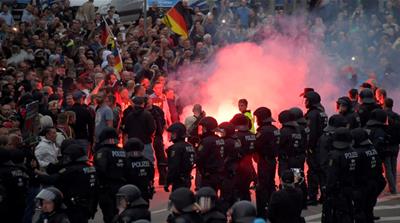Merkel visits German city at epicentre of far-right resurgence
German Chancellor Angela Merkel has made good on a long-promised visit to Chemnitz, an eastern city that has experienced violent far-right rallies and xenophobic riots.
The demonstrations in August occurred after a man, identified as Daniel H by local media, reportedly of Cuban origin, died after being stabbed during an argument.
Two men, of Syrian and Iraqi origin and presumed to be asylum seekers, were arrested by local police in relation to the stabbing.
In Chemnitz, Merkel on Friday spoke at a town hall-style meeting with about 130 readers of a local newspaper, taking “pointed” questions about the situation in Germany, Al Jazeera’s Dominic Kane, reporting from the city, said.
 |
| Riot policemen protected far-right demonstrators against attacks from anti-fascists in Chemnitz [Matthias Rietschel/Reuters] |
“She has been saying, ‘we’re aware of the problem … we want to know what people’s concerns are,'” Kane added.
The arrest of the two men played into a nationwide debate on Merkel’s immigration policies, which have come under increased pressure in recent years, both from the electorate and members of the chancellor’s governing coalition.
The far-right, anti-immigration Alternative for Germany party is now the main opposition party in Germany, after coming third in last year’s general election
Attendees at Friday’s meeting voiced concerns over the resurgence of far-right violence – aside from the far-right clashes, a Jewish restaurant and a Persian eatery were also targeted.
But one attendee also said they felt like “second-class citizens” as residents of former East Germany, which was a member of the Soviet bloc from the 1940s until the Berlin Wall fell in 1989.
Western Germany holds much of the country’s wealth, according to a 2015 study by the Berlin Institute for Population and Development.
Of the 500 richest Germans, only 21 call the east home. Of the 20 most prosperous cities, only one – Jena, is found in the east.
Kane said that Merkel, who is from the east, told the crowd in Chemnitz that said she understands their economic concerns but added that “violence is not the answer”.
Merkel, who took office in 2005, announced in late October she would step down as the head of the Christian Democratic Union and would not run for chancellor in the next federal elections.




